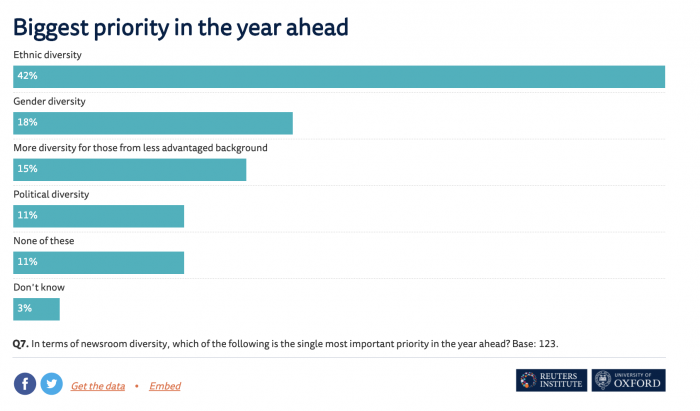More than four out of ten newsroom employees believe ethnic diversity is the highest diversity priority in the next year, according to a new study by the Reuters Institute for the Study of Journalism published on Thursday.
On the heels of the Black Lives Matter movement during a global pandemic ahead of an election in the United States, the Reuters Institute surveyed 136 news industry leaders from 38 countries between September 21 and October 7, 2020. The goal was to better understand how the external challenges of doing journalism in 2020 has impacted news organizations internally. The survey respondents were mostly from the United Kingdom, the United States, India, France, Denmark, Germany, and Spain but responses also came from Australia, Brazil, Colombia, Finland, Indonesia, Kenya, Lithuania, Malaysia, Nigeria, Poland, and Thailand. Respondents hold senior positions in the editorial, business, and product departments of their news organizations.
One respondent emphasized that improving diversity in newsrooms isn’t about numbers, but about how diversity leads to well-rounded coverage.
“It is about allowing staff from diverse backgrounds to tell stories that are important to that group through the lens of that background and for people from that background in a way that resonates with them vs a homogeneous approach,” the CEO of a digital publication in Asia said.
Just 18% said improving gender diversity was the biggest priority, followed by “more diversity for those from a less advantaged background” (I think this means class diversity).

A few other interesting points:
The Institute acknowledged that addressing these issues are difficult on their own, and even more so all at the same time. However, the audiences will be better off when they are addressed:
None of this is easy. Changing a legacy broadcast or print organisation into one able to survive or even thrive in a digital environment is hard, as is starting something new from scratch in an exceptionally competitive market. Continuing this while also covering a global pandemic and dealing with the organisational and financial impact of the coronavirus crisis is even harder. Simultaneously reckoning with the news media’s frequent relative lack of internal diversity and often troubling history of dealing with different kinds of structural inequality is harder still.
But it has to be done. The reality is that audiences are embracing digital media, even if publishers may have reservations about them, that the coronavirus is here, and that a reckoning on diversity is underway.
The continued survival, success, and social standing of individual publishers and of the news media as an institution depend in large part on facing up to these tough challenges. Faced with rapid and complex change, sticking to business-as-usual will arguably be suicidal for the news industry.
Read the full report here.